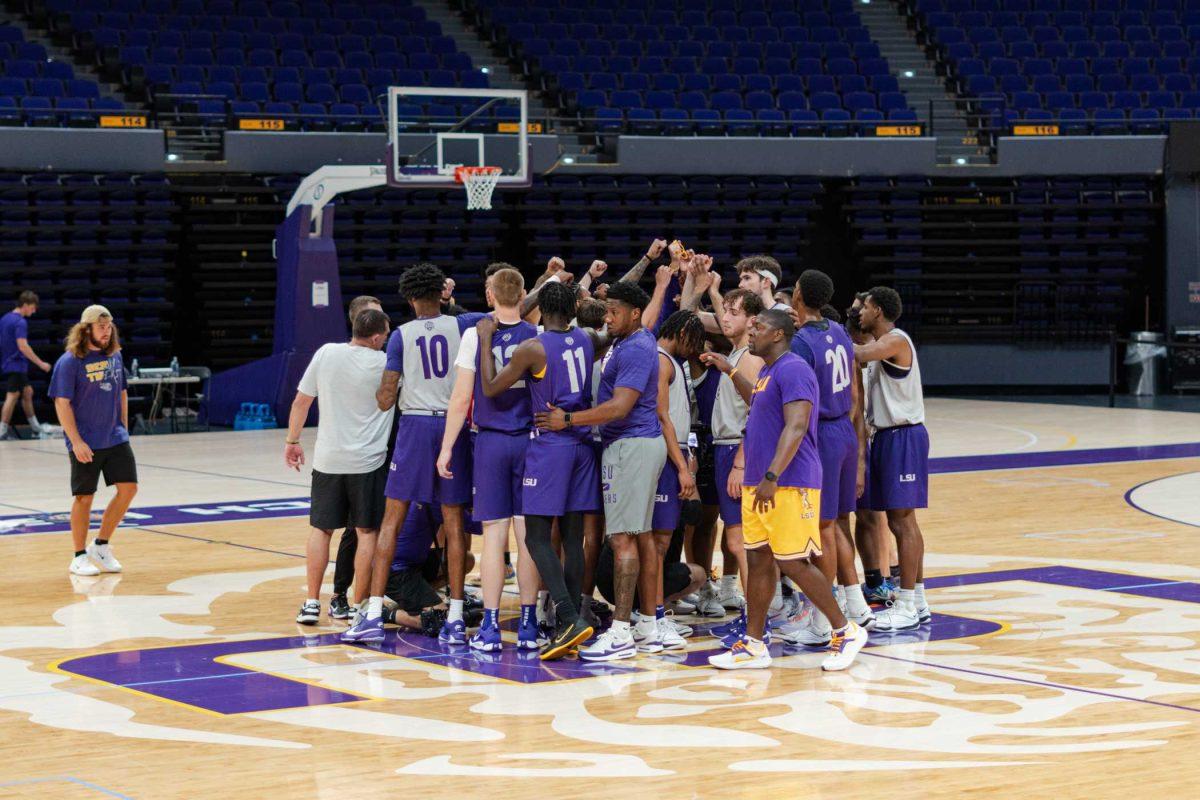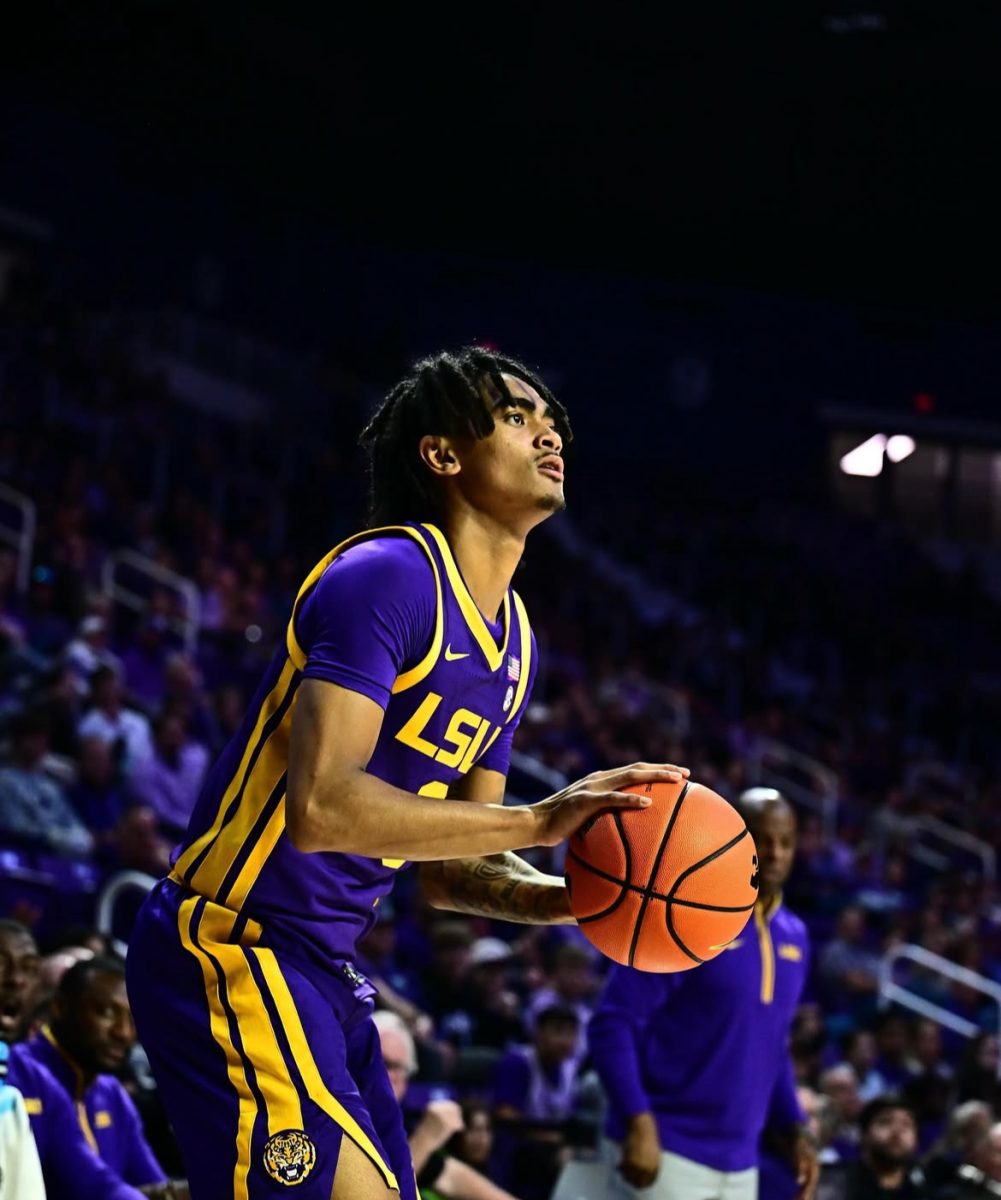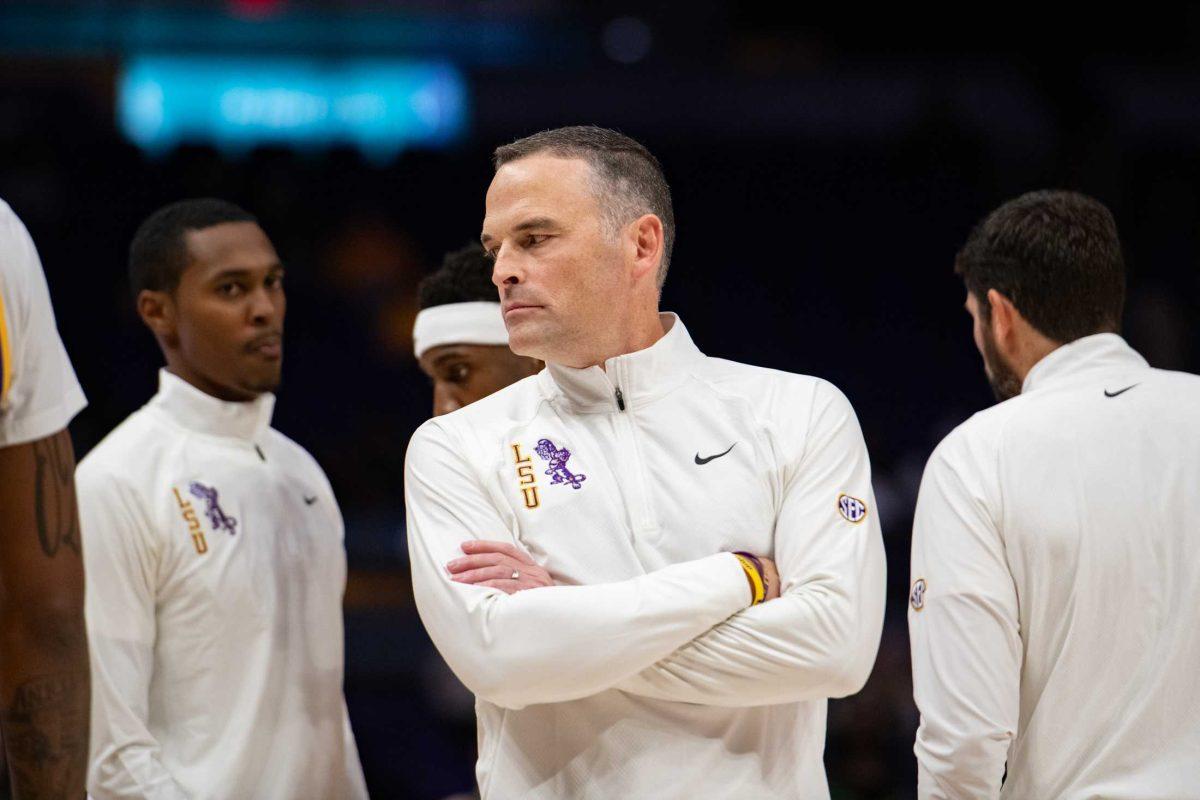After a disappointing 14-19 season, LSU men’s basketball fell victim to yet another transfer exodus, forcing the team to piece together its lineup through the transfer portal. However, the Tigers’ five returning players are an improvement from the three they kept the year before.
The combination of new faces and returning talent has put the starting lineup in question, as we head towards LSU’s opening exhibition hosting Louisiana Christian.
MORE BASKETBALL: Former LSU assistant women’s basketball coach Tasha Butts dies from breast cancer
Here’s a breakdown of the ongoing battles, position-by-position, and a prediction for who’ll initially take each spot on Oct. 30.
Point guard: Jalen Cook/Carlos Stewart
One of the biggest question marks on LSU’s starting lineup is transfer guard Jalen Cook, who returns from Tulane after beginning his college career with the Tigers.
The NCAA has been cracking down on two-time transfers, so Cook has yet to be ruled eligible for this season. Recently, the NCAA has addressed players in similar situations, ruling the players must sit a year before playing for their new school.
Whether or not Cook is allowed to play this season will play a big part in determining the overall success of this team. In his two years at Tulane, he averaged 19 points and 4.2 assists per game while shooting 36.6% from three. He brings a scoring skill that LSU completely lacked in the backcourt last year, as Adam Miller never really broke out.
If he’s allowed to play this year, Cook will undoubtedly start at point guard. If he’s not, the job will go to either Trae Hannibal or Carlos Stewart.
Hannibal followed McMahon over from Murray State before last season and was primarily used as a top reserve. His strength, ability to get to the basket and skill at rebounding at the guard spot were assets last season for the bench unit, and it’s likely McMahon will want him in the role as bench leader again.
Stewart is a skilled scorer who transferred over from Santa Clara after averaging 15.2 points per game on 40.3% three-point shooting. He’s more than capable of driving the offense if Cook is absent.
MORE SPORTS: 3 takeaways from LSU football’s dominant shutout win over Army
Shooting guard: Jordan Wright
If Cook is eligible, the prospect of a starting backcourt with Cook and Stewart is intriguing offensively, especially since Stewart has experience playing off another talented ballhandler last year in Santa Clara with Brandin Podziemski, who’s now in the NBA with the Golden State Warriors.
However, that idea may not be as sound in practice. Cook and Stewart are listed as six-foot and six-foot-one, respectively, and playing two small guards may not be tenable defensively, especially in the SEC.
McMahon did start Justice Hill, six-foot, and Cam Hayes, six-foot-two, together at times last year, so it’s definitely possible he’ll try the Cook-Stewart pairing out, especially against favorable lineups, but he has the personnel this year to avoid doing so.
Instead, Vanderbilt graduate-transfer Jordan Wright could man the second guard spot and provide veteran leadership. Wright started games in all four of his years with the Commodores, and he contributed all the way down the stat sheet.
He makes effort plays defensively and rebounds well for his six-foot-six size. He contributed a solid 11.5 points per game across his final two seasons with Vanderbilt while attempting 3.7 threes per game, though his efficiency from there will need to increase.
Small forward: Tyrell Ward
If McMahon is bold enough to start both Cook and Stewart, Wright would slide to the small forward spot, as he seems like a lock to be in the starting lineup. With Wright at the two-guard spot, the conversation at that position will come down to returners Mwani Wilkinson and Tyrell Ward.
Wilkinson is a six-foot-five wing with prototypical 3-and-D skill, having shot 41.2% from three for his career (albeit on relatively low volume) with solid perimeter defense.
One of only three returners from the 2021-22 squad last year, Wilkinson opened the season as a starter but was benched. His minutes dwindled until he suffered a shoulder injury in January that ended his season.
Ward took over in the starting lineup midway through his freshman season last year, starting eight of the Tigers’ last 11 games. McMahon valued his ability to shoot and score off the dribble, though both of those skills didn’t always translate on the floor.
With an offseason of improvement for the sophomore, Ward may be the favorite, especially with the way Wilkinson’s minutes plummeted early last season.
However, this position is close to a toss-up, and both players figure to have large roles. Wilkinson’s defensive skillset will certainly be key on a roster that needs it, in the starting five or off the bench.
Power forward: Derek Fountain
Although McMahon could presumably go small and start Wilkinson or Ward at the four instead of a traditional power forward (a lineup combination that will probably be explored either way), McMahon’s tendencies in the past and the Tigers’ multitude of options in the big man room seems to indicate that won’t happen.
LSU is deeper at power forward than any other spot on the roster, but senior Derek Fountain has the best odds at starting there.
READ MORE: LSU football dominates from opening possession, beats Army 62-0
Fountain took over as the starter last year from Dec. 10 onward and never looked back, starting 23 straight games. He’s LSU’s leading scorer among returners, and his high motor down low led him to average 8 points, 5.5 rebounds and 1.2 steals per game last year, with a scoring high of 26.
Talented transfer Daimion Collins from Kentucky, a former five-star recruit who was never given much playing time in Lexington, will factor in.
Though he’s a relative unknown, his explosiveness will make him hard to keep off the court. He may push Fountain for the starting spot, but, based on his performance last year, it’s Fountain’s to lose.
LSU also has sophomore Jalen Reed, who opened last season as the starter but was benched after a disappointing start, and four-star freshman Corey Chest. With their talent, it wouldn’t be a surprise to see either of them starting down the line.
Center: Will Baker
The question of who will man the center spot is the easiest one to answer, with Nevada transfer Will Baker the unquestioned favorite.
LSU played three exhibition matches in the Bahamas in August, and amid all the lineup shuffling McMahon did with the new team, Baker was the only player to start every game.
Baker was a third team All-Mountain West selection last year with 13.6 points per game on outstanding efficiency, including a 35.5% clip from beyond the arc. Though Baker has skill as a stretch big, he also operated comfortably out of the post with Nevada, something that will hopefully carry over into the physical SEC.
Baker stands at seven-foot-one, but he’s come up with only 18 blocks through 86 games at the college level, which indicates that McMahon should probably pair his minutes alongside other traditional bigs like Fountain, who can help with rim protection rather than wings.
Still, Baker has rare skill for his size, and he’ll have a big impact for this LSU team.










